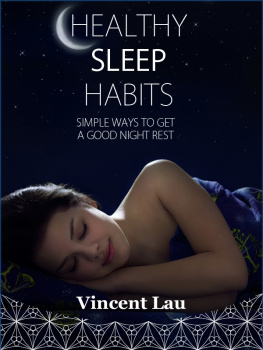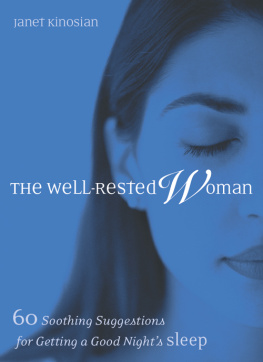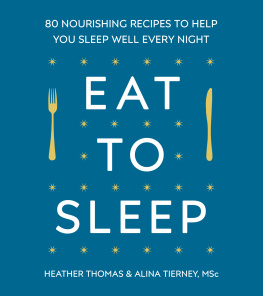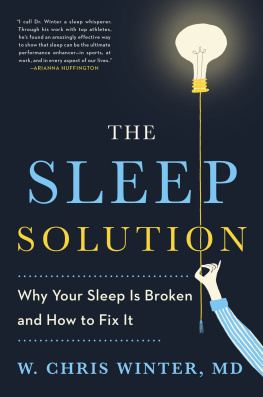CONTENTS


About the Book
Did you know that what you eat makes a difference to your sleep?
These 80 delicious evening recipes are chock-full of the nutrients that boost sleep hormones and keep your body clock on track. Indulge in these comforting suppers and snacks, healthy sweet treats and soothing drinks to calm your body and mind before bedtime. When you eat the right foods you can get a full nights sleep, naturally, and feel the benefits all day long.
About the Authors
HEATHER THOMAS is a health and cookery writer who has authored several books, including The Avocado Cookbook and The Diet Cheats Cookbook.
ALINA TIERNEY is a nutritionist and food consultant who holds an MSc in Nutrition and Food Sciences from the University of Reading.


Introduction
Sleep is just as important for our health as eating well and taking exercise; but the facts show that most of us are sleeping less, the quality of our sleep is deteriorating and insomnia is becoming increasingly common.
Growing awareness about the importance of sleep is starting to encourage us to understand how much sleep we get, how much we need, and how we can make positive and practical changes to sleep better. Many of us have sedentary jobs, dont exercise enough, have poor diets, and spend increasing time in front of computer, tablet and mobile phone screens all of which are affecting the amount and quality of our sleep and, consequently, our health.
The good news is that its possible to sleep longer and more soundly by making a few simple lifestyle changes, especially to our diets. If you struggle to get a good nights sleep, eating sleep-friendly foods and adjusting the timing of your meals could make a big difference. Sleep-friendly foods can calm your mind and boost the hormones that promote good sleep, helping to restore and repair your body while you rest.
This book features more than 80 delicious recipes to help you feel fitter, healthier and more energized, as well as sleep better so you are equipped to cope with the stresses of daily life.
How much sleep do you need?
To a great extent, the amount of sleep you need depends on your age: newborn babies need 1417 hours, teenagers need 810 hours and, ideally, most adults should have eight hours a night.
However, everyone is different and the norm is in the region of seven to nine hours. One-third of us sleep only six hours or less and a poor nights sleep can be defined as less than five hours. As we get older, the length of time we sleep diminishes. Sleep can become disrupted by issues such as the increased need to urinate during the night or hot flushes during menopause.
The benefits of sleep
The health benefits of sleep are diverse and numerous. Sleep strengthens our immune system, helping to protect us from viruses and infections; lowers the risk of high blood pressure, heart disease, stroke and respiratory disorders; and reduces our risk of developing type 2 diabetes. Getting a good nights sleep on a regular basis is also important for enhancing and maintaining brain function, especially our memory, concentration, problem solving, performance and productivity.
The amount of sleep we get can also have an impact on inflammation in the body, especially in the gut and digestive system. There is some evidence that a correlation exists between sleep deprivation and inflammatory bowel diseases.
What makes us sleep?
Our circadian rhythm is the 24-hour internal clock that controls our sleep-wake cycle. It is aligned to the solar day and is affected by the hours of daylight and darkness. It is this system that regulates a number of neurotransmitters and hormones, such as serotonin and melatonin, that control when we sleep and when we are awake. Disruption of the sleep-wake cycle and deficiencies of these hormones are involved not only in sleep disorders but also in the pathology of mental health problems and depression. It is well known that a lack of serotonin is associated with depression and seasonal affective disorder (SAD).
The quality and physiology of our sleep is as important as the number of hours we average per night. If you are deprived of sleep and suffer from insomnia or periods of wakefulness, your sleep cycle will be interrupted, which can impact your health.
Sleep deprivation
Lack of sleep can lead to fatigue, loss of concentration and problems with memory and learning. Over the years there has been growing evidence to suggest that there is a link between little sleep and cardiovascular disease, type 2 diabetes, hypertension, respiratory disorders, obesity and other health conditions. Poor sleep patterns have also been linked to some mental health and emotional conditions, including difficulties with social interaction, anxiety, mood swings and depression.
How sleep affects weight
According to the US National Sleep Foundation, sleep deprivation can inhibit our ability to lose weight even if we exercise regularly and eat healthily increasing our risk of obesity, diabetes and cancer. This is because sleep deprivation affects the levels of the hormones (see ) that regulate our appetites and consequently our food choices. Recent studies suggest that people who are sleep-deprived feel hungrier and crave food they dont need, especially refined carbohydrates and fats, making them more likely to gain weight. It is known that we consume fewer calories when we get good-quality sleep, helping us to maintain a healthy weight.
Its possible to sleep longer and more soundly by making a few simple lifestyle changes, especially to our diets.
Eating for sleep
The role of hormones
When it comes to getting a good nights sleep hormones play an important role. They help to maintain our sleep-wake cycle making us feel sleepy in the evening and waking us up in the morning. By making a few small adjustments to your diet you can promote the hormones that have an impact on sleep.
Melatonin is a hormone that is essential for a healthy sleep cycle; it also controls the way we respond to stress. Its produced in the pineal gland in the brain when it becomes dark. When melatonin levels in the blood rise, sleep becomes inviting.
Bright and artificial light at night inhibits melatonin production, which is why it is advisable to avoid screens like TVs, laptops and phones just before bedtime. There are many other factors that can affect melatonin production, including smoking, stress, working night shifts, age and what you eat. If you are melatonin deficient, you may experience sleeplessness and insomnia.
Walnuts and cherries contain their own melatonin, so eating them may help you fall asleep more quickly. Oats, milk and bananas all boost our melatonin levels and can help to relieve insomnia eating them regularly can help to stabilize your sleep cycle.
Serotonin is not found in food; its a neurotransmitter derived from the amino acid tryptophan (see ). It plays an important role in regulating mood, appetite and sleeping as well as promoting feelings of calm and sleepiness; a deficiency of serotonin is linked to depression.















